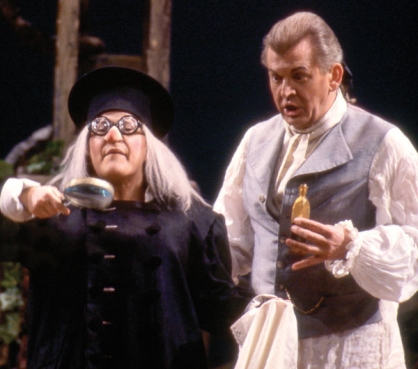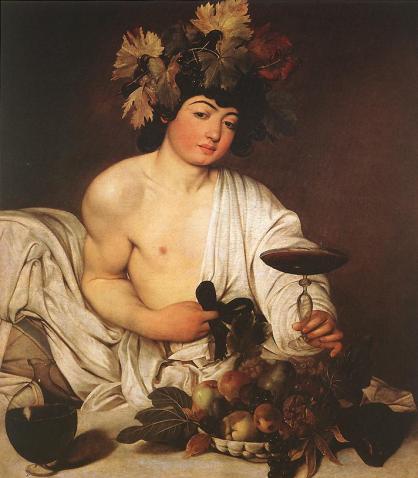Mr. FFF: Παρα θιν αλος. By the breaking sea wave.
MM: I see Priest Chryses praying. For his daughter Chryseis has been kidnapped by Agamemnon who does not want to release her.
…βή δ’ ακέων παρά θίνα πολυφλοίσβοιο θαλάσσης…
πήρε βουβός του πολυτάραχου γιαλού τον άμμον
Ομηρου Ιλιας, Ραψωδια Α34
Without a word, he went by the shore of the noisy sea (or ‘sounding sea’)
Homer, Iliad, A34
Mr. FFF: The priest Chryses prayed to Apollo to punish the Greek army, so that Agamemnon is forced to return to him his daughter, Chryseis.
Mrs. T: The deep sound of the sea is in stark contrast with the priest’s silent suffering.
Είπε, και την ευκή του επάκουσεν ο Απόλλωνας ο Φοίβος,
κι απ᾿ την κορφή του Ολύμπου εχύθηκε θυμό γεμάτος
Ομηρου Ιλιας, Ραψωδια Α43-44
He spoke, and Apollo Phoebus listened to his wish
and from the top pf Olympus he rushed away full of wrath
Homer, Iliad, A43-44
MM: Apollo shot the plague to the Greek Army, and Agamemnon had to return Chryseis to her father.
Mrs. T: As a compensation for his loss, Agamemnon took Bryseis from Achilles.
Mr. FFF: Achilles is furious at the loss of Briseis.

Δακρυσμένος τότε ο Αχιλλέας απ᾿ τους συντρόφους του μακραίνει και καθίζει
μπρος στον ψαρή γιαλό, το απέραντο το πέλαγο θωρώντας,
κι απλώνοντας τα χέρια ευκήθηκε στην ακριβή του μάνα
Ομηρου Ιλιας, Ραψωδια Α348-352
Achilles in tears strays away from his comrades and seats
on the beach, and looking at the vast sea,
unfolded his arms and prayed to his mother
Homer, Iliad, AHomer, Iliad, A348-352
Mr. FFF: Greeks of any age, starting with Homer, have a special relationship with the sea.
Mrs. T: The sea was considered to be the home of many deities.
MM: The sea was also a place of catharsis, a cleansing place for mortals.
Wie Meerekuesten, wenn zu baun
Anfangen die Himmliwschen und herein
Schifft unaufhaltsam, eine Pracht, das Werk
Der Woogen, eins uns andere, und die Erde
Sich ruester aus, darauf vom Freudigsten eines…
Wie Merekuesten…
Friedrich Hoelderlin
As upon seacoasts, when the gods
Begin to build and the work of the waves
Ships in unstoppably wave
After wave, in splendour, and the earth
Attires itself and then comes joy
A supreme, tuneful joy, setting …
(translation by David Constantine)
Wie Merekuesten…
Friedrich Hoelderlin
MM: I see the beach walking and…
Stephen Daedalus: Am I walking into eternity along Sandymount strand? Crush, crack, crick, crick.
MM: Stephen closed his eyes to hear his boots crush crackling wrack and shells.
Leopold Bloom: I am wandering around, avoiding to go home. I am on Sandymount strand. Following Stephen’s steps.
(young) Gerty: It is almost dusk. Roman candles are fizzing through the air.
Leopold Bloom: I cannot get my eyes off her!
(young) Gerty: I pulled my skirt up and revealed my garters.
Leopold Bloom: I surrender, I am too weak to resist.
(young) Gerty: I behaved as an exhibitionist. Will I ever be as important as Molly is?
Leopold Bloom: I behaved as a true voyeur. I am aging.
Mr. FFF: I like garters.
Mrs. T: The description of the episode with Bloom and (young) Gerty made the US Courts to ban the book as indecent.
The beach shines like a mirror, swallowing the confusion of forms, creating whatever it likes.
Here by the beach, I will be covered, in whole, by a layer of sugar, like snow.
It is a sin to be absent from the present.
Nikos Gabriel Pentzikis, Mrs. Ersis’ Novel
Ο γιαλος στιλβει σαν καθρεφτης, καταπινοντας τη συγχυση των μορφων, σχηματιζοντας ο,τι θελει αυτος.
Εδω στην ακρογιαλια, ολοκληρον, θα με καλυψει σαν χιονι ενα στρωμα απο ζαχαρη.
Αμαρτια η απουσια απο το παρον.
Νικος Γαβριηλ Πεντζικης, Το Μυθιστορημα της κυριας Ερσης
Πῶς δύναται τὶς νὰ γίνει ἀνὴρ χωρὶς ν᾿ ἀγαπήσει δεκάκις τουλάχιστον, καὶ δεκάκις ν᾿ ἀπατηθεῖ ;
How could anyone become a man without falling in love at least ten times, and betrayed ten times?
Alexandros Papadiamantis
MM: I see the kissing-on-the-beach sequence where Lancaster and Kerr roll around in the Pacific Ocean’s frothy waves, lips locked as the surf washes over them.
Mrs. T: Lancaster’s sergeant (Milton Warden) with Deborah Kerr playing Karen Holms, another officer’s wife
Mr. FFF: The American censors deleted four seconds from that provocative love-making scene.
Mrs. T: From Here to Eternity was nominated for 13 Oscars and won eight, including best film and best director. It won rave reviews and became one of the highest-grossing films of the Fifties.
Du musst das Leben nicht verstehen,
dann wird es werden wie ein Fest.
You should not understand Life,
then it will be like a celebration.
Rainer Maria Rilke
MM: I see the beach swimming after sunset
Mrs. T: I have never done this.
Mr. FFF: I had a friend who rejoiced every time she had a chance to swim during the night. She could stay up all night swimming.
Τα πρωτα μου χρονια τ’ αξεχαστα τα’ ζησα κοντα στ’ ακρογιαλι,
Στη θαλασσα εκει τη ρηχη και την ημερη,
στη θαλασσα εκει την πλατιεα, τη μεγαλη…
Στη θαλασσα εκει…
Κωστης Παλαμας
I have lived my first unforgetable years by the beach,
There by the shallow and quite sea,
the wide, the great sea, there…
There by the sea
Kostis Palamas
MM: I see the Hotel des Roses in Rhodes.
Mrs. T: I like roses.
Mr. FFF: This is where I was going to swim when I was a kid. For hours on and on. 10am to 7pm. Full time job.
MM: I see the bay of Ladiko, near Kolymbia in Rhodes.
Mrs. T: Looks great!
Mr. FFF: It was even better when there was nobody there! Years ago, access to the bay was blocked and the man who had the keys was a good family friend.
MM: I see food and drinks by the beach.
Mrs. T: Allow me. First stop is Damianos Fishtavern, Ambelas, Paros island, Greece.
Mr. FFF: Wonderful setting, and dedication to serving good seafood all year round.
Mrs. T: It is amazing how different food tastes when you smell the sea breeze!
MM: I see food and drinks on the cliff.
Mrs. T: Second stop. Akelare Restaurante, San Sebastian, Basque Country.
Mr. FFF: Up on a cliff, overlooking the Atlantic, stands one of the shrines of gastronomy in the wonderful land of the Basque people.
Mrs. T: The place is full of the joy of life.

MM: I see seafood by the beach at night.
Mrs. T: Third stop. Ristorante Uliassi, Senigallia, Marche, Italia.
Mr. FFF: Now we are in the Riviera Romagnola, where the ITalians have invented the “beach without the sea”. Nevertheless, in this riviera, where everything happens, where the high and the low co-exist peacefully, Uliassi does his magic. It is worth the trip. Even if you do not make it to the sea.
MM: I see seafood on a balcony overlooking the beach.
Mrs. T: Aristodimos Fishtavern, Pachi, Megara, Greece.
Mr. FFF: Back to the homeland. An unassuming small seaside town 40 km from Athens presents the goods of the sea in a way that honors centuries of eating seafood.

MM: I see Death encounters by the beach.
Mrs. T: Disillusioned knight Antonius Block and his squire Jöns return after fighting in the Crusades and find Sweden being ravaged by the plague. On the beach immediately after their arrival, Block encounters Death.
Mr. FFF: Black and White. The agony of Man in front of the inevitable. But the sea makes everything look natural. This is why the sea gives another meaning to life.
Mrs. T: (reading from a book): “The whole beach, once so full of colour and life, looked now autumnal, out of season; it was nearly deserted and not even very clean. A camera on a tripod stood at the edge of the water, apparently abandoned; its black cloth snapped in the freshening wind.”
Mr. FFF: (reading from the same book): “Some minutes passed before anyone hastened to the aid of the elderly man sitting there collapsed in his chair. They bore him to his room. And before nightfall a shocked and respectful world received the news of his decease.”
“Prayer does not change God, but it does change the one who prays.”
Soren Kirkegaard
“The essence of truth is freedom”
Martin Heidegger
Participants
Achilles
Ingmar Bergman, Swedish Film Director
Leopold Bloom
Briseis
Priest Chryses
Chryseis
Stephen Daedalus
Mr. FFF, wanderer
Caspar David Friedrich, German Painter
Martin Heidegger, German Philosopher
Friedrich Hoeldrlin, German Poet
(young) Gerty
Homer, Greek Poet
Soren Kirkegaard, Dane Philosopher
MM, partner
Kostis Palamas, Greek Poet
Alexandros Papadiamantis, Greek Writer
Nikos Gabriel Pentzikis, Greek Writer and Painter,
Otto Preminger, American Film Director
Rainer Maria Rilke, Bohemian-Austrian Poet
Mrs. T, gourmant
References
Akelare Restaurant, San Sebastian, Basque Country
Aristodimos Fishtavern, Pachi, Megara, Greece
Damianos Fishtavern, Ambelas, Paros Island, Greece
From Here to Eternity, A Film by: Otto Preminger
A Hole in the Head. A Film by: Frank Capra
Edge of Heaven (Auf der anderen Seite), A Film by Fatih Akin
Restaurante Uliassi, Senigallia, Marche, Italia




























































![vampires-nosferatu[1]](http://panathinaeos.files.wordpress.com/2012/07/vampires-nosferatu1.jpg?resize=300%2C300)




























































































